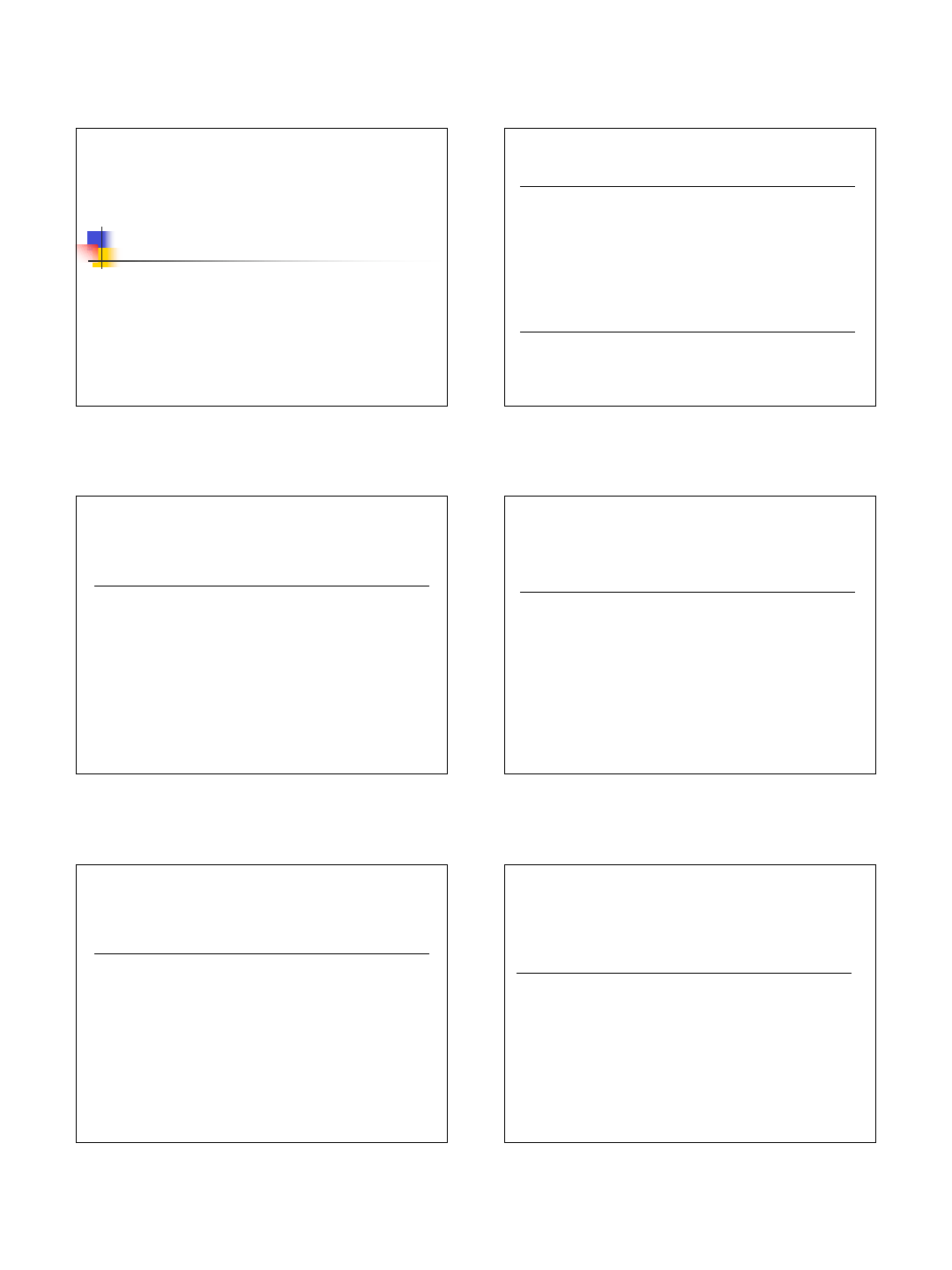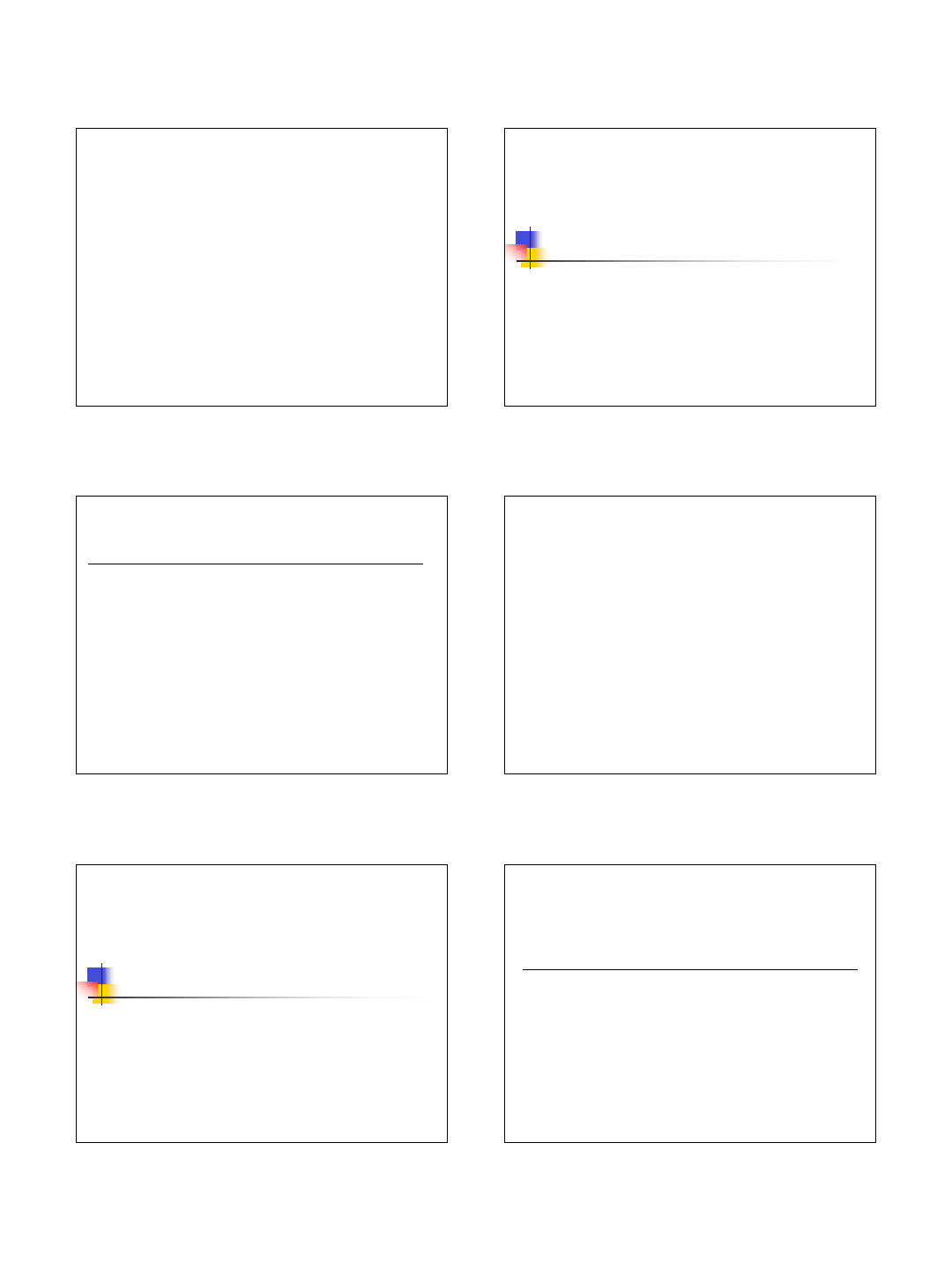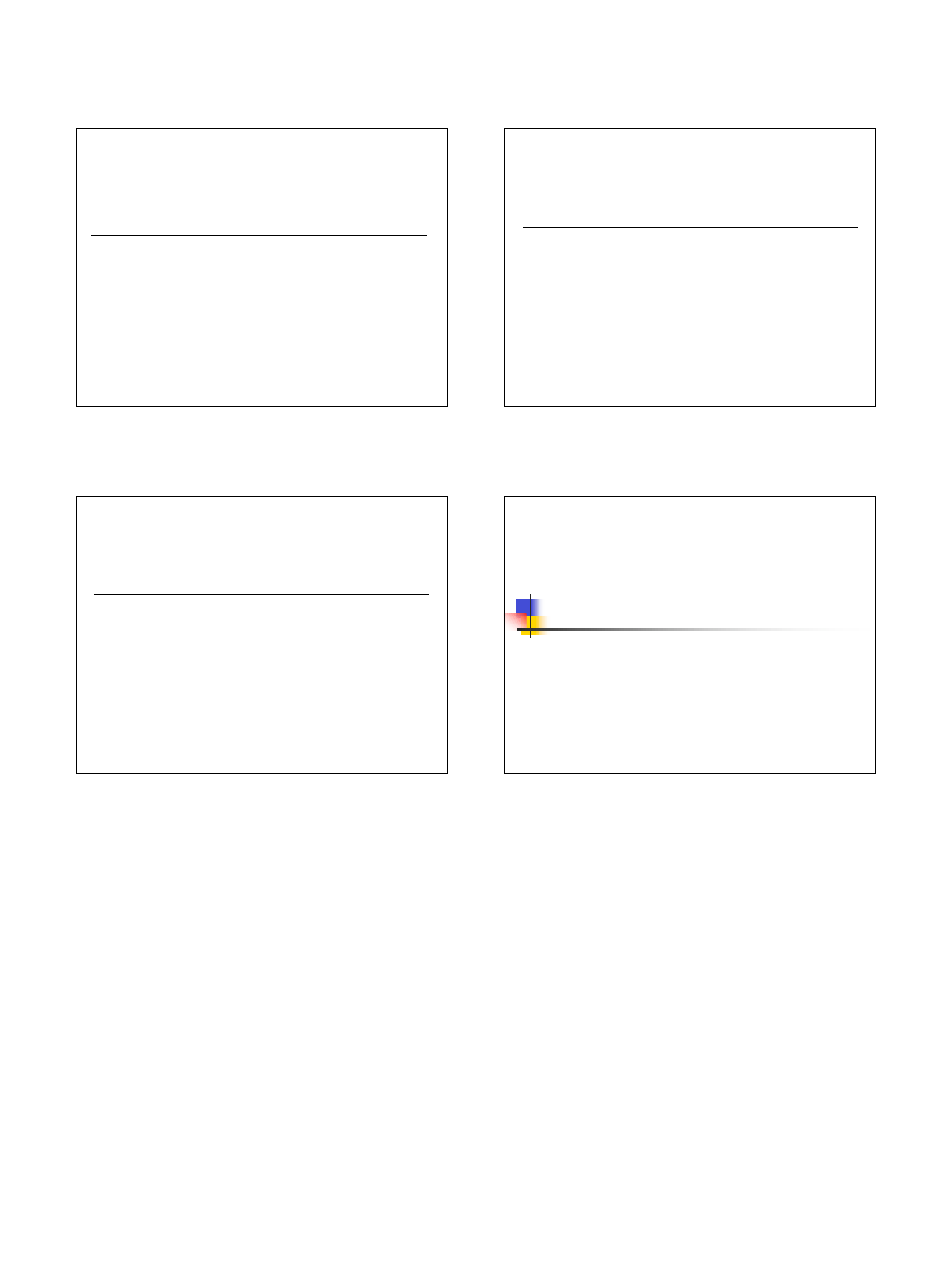
1
Lecture 15
Exceptions I
Exceptional Events
n Sometimes, bad stuff happens...
int main()
{
int arg1,arg2;
cout << “Enter two numbers and I will add them…” << endl;
cout << “Number 1: “;
cin >> arg1;
cout << “Number 2: “;
cin >> arg2;
cout << “The result is : “ << arg1 + arg2 << endl;
}
Enter two numbers and I will add them…
Number 1: 4.9
Number 2: 3.76
The result is 7
Exceptional Events
n So, you try to deal with it…
n The following will work, but assumes a console based user
interface...
// Read in an integer. Make SURE it’s an integer!
int readInt()
{
float floatVal;
cin >> floatVal;
while (floatVal != (int) floatVal) // Is this an integer?
{
cerr << “Input an INTEGER, please… “;
cin >> floatVal;
}
return ( (int) floatVal );
}
Exceptional Events
n What if we’re using a GUI system?
n It would be better to simply signal the calling function that
invalid input was encountered...
// Read in an integer. Return false if an invalid number
// was entered
bool readInt(int &returnVal)
{
float floatVal;
cin >> floatVal;
if (floatVal != (int) floatVal) // Is this an integer?
return false;
returnVal = (int) floatVal;
return true;
}
Exceptional Events
n Well, OK, that will work, but it’s not a general purpose solution.
n Suppose we’re dealing with overloaded operators where we don’t
have the option of passing an additional parameter...
// Overload [] to allow individual array element access.
int &MyIntArray::operator[](int index)
{
// Define a bad value to return when index is invalid
int badValue = -1;
// Check for index validity
if ((index >= 0) && (index < arrayLength))
return storagePtr[index];
else
return badValue; // index was bad!
}
Exceptional Events
n Well, that solution isn’t really the greatest.
n The variable badValue is local to the overloaded operator
member function, and since we are returning a reference…
n We could use a global and/or static member variable...
// Define a bad value to return when index is invalid
int badValue = -1;
// Overload [] to allow individual array element access.
int &MyIntArray::operator[](int index)
{
// Check for index validity
if ((index >= 0) && (index < arrayLength))
return storagePtr[index];
else
return badValue; // index was bad!
}

2
Exceptional Events
n This solution will work, but the problem is that -1 is a valid
integer, so we’d never know if the return value was legitimate
or signaling an error condition.
n We could set an arbitrary boolean flag in a global variable...
// Define a bad value to return when index is invalid
bool badIndex = false;
int badValue = -1;
// Overload [] to allow individual array element access.
int &MyIntArray::operator[](int index)
{
badIndex = false;
if ((index >= 0) && (index < stringLength))
return storagePtr[index];
badIndex = true;
return badValue; // still need to return something!
}
Exceptional Events
n OK, aside from the sheer ugliness of this solution, consider
the following problem…
n What happens if the array access happens in the middle of
an expression?
// Apply secret formula to two numbers at indices n and d
bool secretFormula(MyIntArray *array,int n,int d,
float &result)
{
result = array[n] / (1 + array[d]); // SECRET FORMULA !!!
// Check for bad index
if (badIndex)
return false; // Signal unsuccessful operation
// Signal that operation was successful
return true;
}
Exceptional Events
n If an invalid denominator index were passed,
MyIntArray::operator[] would have set badIndex to
true and returned badval which is -1.
n And, if you were on a machine that didn’t like divide by zero,
you might crash before ever getting to your validity check.
n So what we have here is a solution that is ugly and doesn’t
protect you from all situations!
n There must be a better way!
n Enter C++ exceptions.
n What is a C++ exception?
C++ Exceptions
n A C++ exception is an abrupt transfer of control, usually resulting
from an error condition.
n When an error condition is encountered, the programmer may
choose to throw an exception.
n This initiates an immediate transfer of control. But to where?
n An assumption is made that if the programmer has chosen to throw
an exception, he/she has also provided a place to catch the
exception.
n Perhaps a simple example would help...
enum MathErr { noErr, divByZero, genericOverflow };
float divide(float numerator,float denomiator)
{
if (denominator == 0)
throw divByZero;
return numerator/denominator;
}
Somebody Catch Me!!!
n An assumption is made that the programmer has set up a
place for exceptions to be caught when they occur.
n This is done with a try block.
n It looks something like this:
int main()
{
try {
cout << “3/2 is “ << divide(3,2) << endl;
cout << “2/0 is “ << divide(2,0) << endl;
}
catch(MathErr x) {
if (x == divByZero)
cerr << “Divide by zero caught. “ << endl;
else cerr << “Other error caught. “ << endl;
}
}
Somebody Catch Me!!!
n The try statement simply defines a scope inside which any
exceptions that occur might be caught by catch statements
immediately following the try.
n The catch statement is a little more complicated.
n It’s syntax is one of the following:
n catch(
type
variableName
) { }
n catch(…) { }
n The first form is somewhat like a function declaration.
n You specify a variable declaration which will be instantiated
by the value thrown if and only if that value matches (type
wise) the type declared in the catch statement.
n Inside the scope of the catch, the variable declared in the
catch statement is accessible as a local variable.

3
Somebody Catch Me!!!
n If the value thrown doesn’t match (type wise) the catch
statement(s) you supply, the exception is thrown up to the
next try block.
n If there are no other try blocks present, the exception is
handled by the runtime environment as an unhandled
exception.
n This usually means a generic dialog box and/or program
termination.
n In the case of CodeWarrior on the Mac, the program simply
terminates with no notification from the runtime environment.
n Now that we’ve spelled it all out, let’s go back to a simple
example...
Demonstration #1
A Simple Exception
More About Catching
n For every try statement you have, you can have multiple
catch statements each dealing with a separate type:
void executeSomeFunction()
{
throw 1.4; // CodeWarrior represents this as a DOUBLE
}
int main()
{
try {
executeSomeFunction(); // Arbitrary function
}
catch(int x) { cerr << “Caught INTEGER: “ << x << endl; }
catch(float f) { cerr << “Caught FLOAT: “ << f << endl; }
catch(string s) { cerr << “Caught STRING: “ << s << endl; }
catch(…) { cerr << “Generic exception caught” << endl; }
}
More About Catching
n When deciding on which catch() to pass control to, the
compiler does no implicit type conversion to force a match.
n Given the preceding try/catch block, the exception would be
caught by the generic block and not the FLOAT block.
n Let’s verify that...
Demonstration #2
Multiple Catches
More About Throwing
n Specifically, when an exception is thrown a temporary variable is
created and the expression used to throw the exception is
evaluated and stored in this temporary variable.
n You can cast the thrown value to force entry into a specific handler:
void executeSomeFunction()
{
throw (float)1.4; // Force exception to be of type float
}
int main()
{
try { executeSomeFunction(); }
catch(int x) { cerr << “Caught INTEGER: “ << x << endl; }
catch(float f) { cerr << “Caught FLOAT: “ << f << endl; }
catch(string s) { cerr << “Caught STRING: “ << s << endl; }
catch(…) { cerr << “Generic exception caught” << endl; }
}

4
More About Throwing
n You may also throw user-defined types…
n You can “construct” new instances of classes right in the
throw statement by calling a given type’s constructor...
class MyIndexError {
MyIndexError(int i,char *msg):badIndex(i),theMsg(msg){}
int getBadIndex() { return badIndex; }
string getMessage() { return theMsg; }
private:
int badIndex;
string theMsg;
};
int &MyIntArray::operator[](int index)
{
if ((index < 0) || (index >= numElements))
throw MyIndexError(index,”Index out of bounds”);
return storagePtr[index];
}
More About Throwing
n Now, I can set up to catch this exception like this:
int main()
{
MyIntArray testArray;
try {
cout << “Element 10 is “ << testArray[10] << endl;
}
catch(MyIndexError mie)
{
cerr << “Error, index “ << mie.getBadIndex() << “: “
<< mie.getMessage() << endl;
}
}
n // This will yield the message:
n Error, index 10: Index out of bounds
Who’s Got It?
n Actually, I could have set up one of four catch statements to
catch exceptions of type MyIndexError.
n They are:
catch(MyIndexError mie){} // Copy of object thrown in mie
catch(MyIndexError &mie){} // reference of object thrown in mie
catch(MyIndexError){} // no access to object thrown
catch(…){} // no access to object thrown
n We mentioned earlier that if an exception wasn’t caught by
the catch statements in a given try block, the runtime
environment would look for any other try blocks further up the
stack and try their catch statements.
n That would look something like this:
Who’s Got It?
n If globalIntArray is only 50 elements big, what happens?
void func1()
{
try {
func2();
} catch(ArrayIndexError aie) {
cout << “Array Index Error: “ << aie.getMsg() << endl;
}
}
void func2()
{
try {
float x = divide(globalIntArray[15334],globalIntArray[1]);
} catch(MathErr me) {
cout << “Math Error encountered: “ << me.getMsg() << endl;
}
}
Who’s Got It?
n By the same token, be careful of using built in types for throwing
exceptions. You might just catch something you didn’t intend on!
n Suppose we had decided to use an enum to differentiate between
an index error and a divide by zero error in our previous example.
n We might cast the enum to an int when throwing and implement
func2() like this:
void func2()
{
try {
float f = divide(globalIntArray[15334],globalIntArray[1]);
} catch(int x) {
if (x == divByZero)
cerr << “Divide by Zero caught! “ << endl;
else cerr << “Generic exception caught: “ << x << endl;
}
}
Demonstration #3
Catching More than You Expect

5
Even More about Throwing
n Sometimes, when catching an exception, you can only do “so
much” to fix the situation.
n Consider a routine to move a robot to a series of positions.
When done, you must return the robot to its original position:
// Some routine to read an array of Positions from the user
int getPositionSequence(Position *arrayOfPositions)
{ … }
// Call to move robot to a specific position. If aPos is
// invalid a BadPositionException exception is thrown
void MoveRobot(Position &aPos)
{
if (badPos(aPos))
throw BadPositionException(aPos);
// Continue with move logic…
}
Even More about Throwing
n When we execute the code which moves the robot to each successive
position, we are prepared to catch a BadPositionException.
n When we catch it, we return the robot to its original position.
n But we have no concept of GUI here, how is the user notified?
// Move the robot to a succession of positions
void MoveRobot(Position *positions,int numPos)
{
Position origPos = getCurrentPosition();
try {
for (int i=0; i<numPos; i++)
MoveRobot(positions[i]);
} catch(BadPositionException bpe) {
MoveRobot(origPos);
throw; // What does this do?
}
MoveRobot(origPos);
}
Even More about Throwing
n throw by itself simply re-throws the current exception.
n The assumption is that someone further up the chain is
ready to catch it, of course!
// Move a robot
void MoveTheRobot()
{
Position *positionArray;
int numPositions = getPositionSequence(&positionArray);
try {
MoveRobot(positionArray,numPositions);
} catch(BadPositionException bpe) {
cerr << “Error: attempt to move robot to bad “ <<
<< “position “ << endl << “POSITION “ <<
<< bpe.getBadPosition() << endl;
}
}
Lecture 15
Final Thoughts
